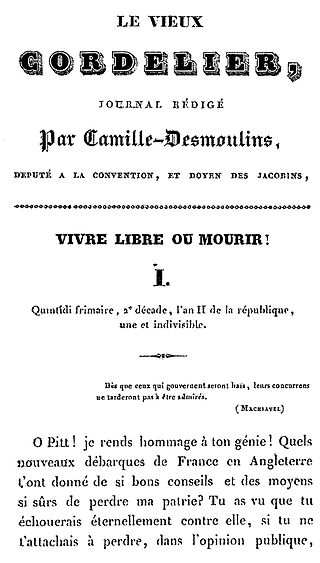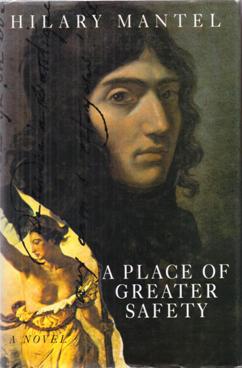
Georges Jacques Danton was a leading figure in the French Revolution. A modest and unknown lawyer on the eve of the Revolution, Danton became a famous orator of the Cordeliers Club and was raised to governmental responsibilities as the French Minister of Justice following the fall of the monarchy on the tenth of August 1792, and was allegedly responsible for inciting the September Massacres. He was tasked by the National Convention to intervene in the military conquest of Belgium led by General Dumouriez, and in the spring of 1793 supported the foundation of a Revolutionary Tribunal, becoming the first president of the Committee of Public Safety.

The Committee of Public Safety was a committee of the National Convention which formed the provisional government and war cabinet during the Reign of Terror, a violent phase of the French Revolution. Supplementing the Committee of General Defence, created early January 1793, the Committee of Public Safety was created on 6 April 1793 by the National Convention. It was charged with protecting the new republic against its foreign and domestic enemies, fighting the First Coalition and the Vendée revolt. As a wartime measure, the committee was given broad supervisory and administrative powers over the armed forces, judiciary and legislature, as well as the executive bodies and ministers of the convention.

The following is a timeline of the French Revolution.

Lucie-Simplice-Camille-Benoît Desmoulins was a French journalist, politician and a prominent figure of the French Revolution. He is best known for playing an instrumental role in the events that led to the Storming of the Bastille. Desmoulins was also noted for his radical criticism of the Reign of Terror as the editor of the journal Le Vieux Cordelier. He was a schoolmate and close friend of Maximilien Robespierre and a close friend and political ally of Georges Danton, who were the leading figures in the French Revolution.

Antoine Quentin Fouquier de Tinville, also called Fouquier-Tinville and nicknamed posthumously the Provider of the Guillotine was a French lawyer and accusateur public of the Revolutionary Tribunal during the French Revolution and Reign of Terror.

Dantons Tod is an opera by Gottfried von Einem to a libretto by Boris Blacher and Gottfried von Einem after Georg Büchner's 1835 play of the same name. Its first performance took place in Salzburg on 6 August 1947. It was revised in 1955.
The Hébertists, or Exaggerators, were a radical revolutionary political group associated with the populist journalist Jacques Hébert, a member of the Cordeliers club. They came to power during the Reign of Terror and played a significant role in the French Revolution.

Anne-Lucile-Philippe Desmoulins, born Laridon-Duplessis was a French revolutionary, diarist, and author during the French Revolution. She was married to the revolutionary Camille Desmoulins. She was executed eight days after Camille Desmoulins and Georges Danton, accused of conspiring to free her husband and involvement in counter-revolutionary activities.

Danton's Death was the first play written by Georg Büchner, set during the French Revolution.

Danton is a 1983 French-language film depicting the last weeks of Georges Danton, one of the leaders of the French Revolution. It is an adaptation of the 1929 play The Danton Case by Stanisława Przybyszewska.

La Révolution française is a two-part 1989 historical drama co-produced by France, Germany, Italy and Canada for the 200th anniversary of the French Revolution. The full film runs at 360 minutes, but the edited-for-television version is slightly longer. It purports to tell a faithful and neutral story of the Revolution, from the calling of the Estates-General to the death of Maximilien de Robespierre. The film had a large budget and boasted an international cast. It was shot in French, German and English.
The following lists events that happened during 1794 in the French Republic.
During the French Revolution, modérantisme or the faction des modérés was the name the Montagnards gave to their relatively more moderate opponents, first the Girondins and then the Dantonists. Modérantisme was denounced before the Jacobin and the Cordeliers clubs, who then led the first attacks on it in 1794.

Le Vieux Cordelier was a French journal published by Camille Desmoulins between 5 December 1793 and 3 February 1794 at the instigation of Georges Danton and warned not to exaggerate the revolution. Desmoulins argued that the French Revolution should return to its original ideas en vogue around 10 August 1792.

Maximilien François Marie Isidore de Robespierre was a French lawyer and statesman, widely recognised as one of the most influential and controversial figures of the French Revolution. Robespierre fervently campaigned for the voting rights of all men and their unimpeded admission to the National Guard. Additionally, he advocated the right to petition, the right to bear arms in self-defence, and the abolition of the Atlantic slave trade. He was a radical Jacobin leader who came to prominence as a member of the Committee of Public Safety, an administrative body of the First French Republic. His legacy has been heavily influenced by his actual or perceived participation in repression of the Revolution's opponents, but is notable for his progressive views for the time.

Errancis Cemetery or Cimetière des Errancis is a former cemetery in the 8th arrondissement of Paris and was one of the cemeteries used to dispose of the corpses of guillotine victims during the French Revolution.

Danton is a 1931 German historical drama film directed by Hans Behrendt and starring Fritz Kortner, Lucie Mannheim and Gustaf Gründgens. It depicts the dramatic downfall and execution of Georges Danton in 1794 at the hands of Maximilien Robespierre.

A Place of Greater Safety is a 1992 novel by Hilary Mantel. It concerns the events of the French Revolution, focusing on the lives of Georges Danton, Camille Desmoulins, and Maximilien Robespierre from their childhood through the execution of the Dantonists, and also featuring hundreds of other historical figures.

The Gods Are Athirst is a 1912 novel by Anatole France. It is set in Paris in 1793–1794, closely tied to specific events of the French Revolution.
Hervé Leuwers is a French historian. He is a specialist on Maximilien Robespierre, the history of the French Revolution, and the history of justice and judicial professions.
















